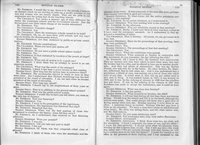542-543
| Previous Page | Next Page |

|
Mr. Emerson. I would like to say there is in the islands, I believe, an element which we are striving to raise up, a goodly remnant of the men and women who are mostly chaste. They are the girls in our seminaries and the young men in our boarding schools.
The Chairman. You spoke, a moment ago, of some difference between the missionary schools and the Government schools. Has the Government over there taken charge of the secular education?
Mr. Emerson. Yes.
The Chairman. Complete charge?
Mr. Emerson. Yes.
The Chairman. Have the missionary schools ceased to be held?
Mr. Emerson. Oh, no; we have three girls' schools and two boys' schools besides the Kamehameha School.
Senator Sherman. Are they sustained by public or private contributions.
Mr. Emerson. Private contributions.
The Chairman. Those you have just spoken of?
Mr. Emerson. Yes.
The Chairman. DO you have a public school system beside?
Mr. Emerson. Yes.
The Chairman. Is that sustained by taxation of the people at large?
Mr. Emerson. Yes.
The Chairman. What sort of system is it; a good one?
Mr. Emerson. I think there was an attempt to model it on our American system.
The Chairman. What was the result of the attempt?
Mr. Emerson. I think it has been a great success in that country.
Senator Gray. How long has the system been in existence there?
Mr. Emerson. The missionaries started to teach so soon as they went there. But I understand that Richard Armstrong was the first president of the board of education. I am not sure when he became president of the board of education.
Senator Gray. How long ago, about?
Mr. Emerson. I should say in the neighborhood of forty years or more.
Senator Gray. That is in addition to the general school system?
Mr. Emerson. That was the public-school system.
Senator Sherman. I would like to have you tell where you were on the 14th day of January.
Mr. Emerson. That was Saturday?
Senator Sherman. Yes.
Mr. Emerson. I went to the prorogation of the legislature.
Senator Sherman. The legislature was dissolved that day?
Mr. Emerson. Dissolved that day.
Senator Sherman. When was the first meeting of those who threatened to overthrow the Queen; when did that occur?
Mr. Emerson. AS I understand, that occurred on that Saturday afternoon.
Senator Sherman. Were you present?
Mr. Emerson. I was not.
Senator Sherman. Did you take any part in that?
Mr. Emerson. I did not.
Senator Sherman. Of whom was that composed—what class of citizens?
Mr. Emerson. I think of those who were the merchants and the
|
planters of the town. It was composed of the men who were, perhaps, most largely interested in good government.
Senator Sherman. To what extent did the native population participate in that meeting?
Mr. Emerson. To no extent whatever, as I understood it.
Senator Sherman. Was that meeting held in the evening?
Mr. Emerson. In the afternoon.
Senator Sherman. Was any resolution passed at that meeting?
Mr. Emerson. Really, I know very little of what was done, except as I have read the newspaper accounts. As I understand it, they appointed a committee of safety.
The Chairman. That is hearsay. Of course, we can get nearer to it than that.
Senator Sherman. Have we the proceedings of that meeting; have they been published?
Senator Gray. Yes.
Senator Sherman. The proceedings of that first meeting?
The Chairman. Yes.
Senator Gray. When the resolutions were passed.
Senator Sherman. What occurred on Sunday in connection with this movement, do you remember, the day following the 15th?
Mr. Emerson. All I know is this: My brothers were interviewed. They are laymen, and they were asked to state what arms they had. My brother had two rifles, and he offered to loan one to another gentleman. And they had plenty of ammunition. This was my brother Joseph, who was with me in the house. My other brother, Dr. Emerson, mentioned that he had arms, too. And it was understood that a gentleman, a friend of ours, was making out a list of those who could rally at any time. It would seem in that city we got rather used to this sort of thing. It was worked before, in 1887; it was worked in 1889, and it was by the rallying of citizens in 1889 that the rebellion was put down. It was by the rallying of the citizens in 1887 that Kalakaua was made to accept the constitution, and it could be done again.
Senator Sherman. What was done that Sunday?
Mr. Emerson. A list was gotten.
Senator Sherman. What occurred on Monday, the 16th?
Mr. Emerson. I will say that during all this time there was intense feeling. We felt it in the church and felt it on the street, although the natives were quiet. You could always tell there was a good deal of feeling among white men, too. Monday morning I went down to my office. I remember being so excited. Perhaps this fact may bear a little on the situation. We have a room there where we sell Bibles and other books. My clerk was sitting there, and two other native men, and Mr. Hall came in.
Senator Gray. Do you mean missionary men?
Mr. Emerson. Not missionary men; they were native Hawaiians.
Senator Gray. Aborigines?
Mr. Emerson. Aborigines. I think there were two, my clerk, and the aborigines. I think I remember the name of one, and the other— I know his face perfectly. I do not know what his alliances were, whether he was a Queen man or not. But I will say this—the word was called out—"We are entirely through with this Queen; we will have nothing more to do with this Queen." I made the remark in the office in the presence of these natives, and I was sustained by the
| Previous Page | Next Page |